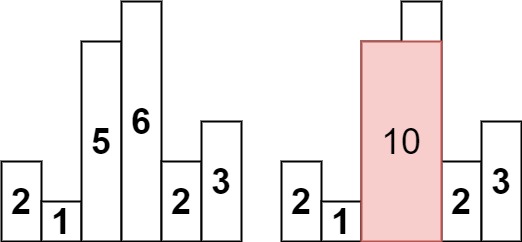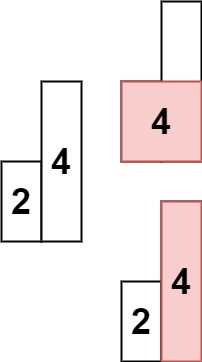LeetCode-in-All
84. Largest Rectangle in Histogram
Hard
Given an array of integers heights representing the histogram’s bar height where the width of each bar is 1, return the area of the largest rectangle in the histogram.
Example 1:

Input: heights = [2,1,5,6,2,3]
Output: 10
Explanation: The above is a histogram where width of each bar is 1.
The largest rectangle is shown in the red area, which has an area = 10 units.
Example 2:

Input: heights = [2,4]
Output: 4
Constraints:
1 <= heights.length <= 1050 <= heights[i] <= 104
Solution
impl Solution {
pub fn largest_rectangle_area(heights: Vec<i32>) -> i32 {
Self::largest_area(&heights, 0, heights.len())
}
fn largest_area(heights: &[i32], start: usize, limit: usize) -> i32 {
if heights.is_empty() || start == limit {
return 0;
}
if limit - start == 1 {
return heights[start];
}
if limit - start == 2 {
let max_of_two_bars = heights[start].max(heights[start + 1]);
let area_from_two = heights[start].min(heights[start + 1]) * 2;
return max_of_two_bars.max(area_from_two);
}
if Self::check_if_sorted(heights, start, limit) {
let mut max_when_sorted = 0;
for i in start..limit {
max_when_sorted = max_when_sorted.max(heights[i] * (limit - i) as i32);
}
return max_when_sorted;
} else {
let min_ind = Self::find_min_in_array(heights, start, limit);
return Self::max_of_three_nums(
Self::largest_area(heights, start, min_ind),
heights[min_ind] * (limit - start) as i32,
Self::largest_area(heights, min_ind + 1, limit),
);
}
}
fn find_min_in_array(heights: &[i32], start: usize, limit: usize) -> usize {
let mut min = i32::MAX;
let mut min_index = 0;
for i in start..limit {
if heights[i] < min {
min = heights[i];
min_index = i;
}
}
min_index
}
fn check_if_sorted(heights: &[i32], start: usize, limit: usize) -> bool {
for i in start + 1..limit {
if heights[i] < heights[i - 1] {
return false;
}
}
true
}
fn max_of_three_nums(a: i32, b: i32, c: i32) -> i32 {
a.max(b).max(c)
}
}

